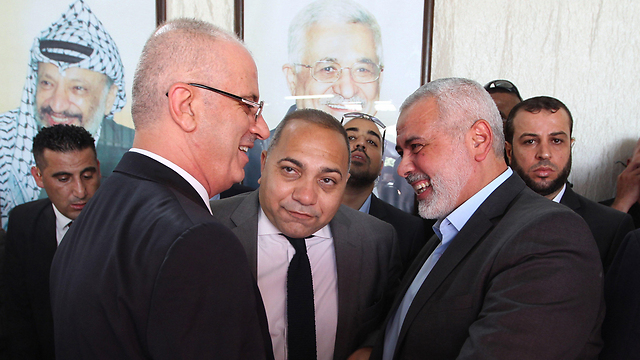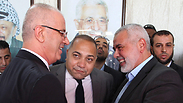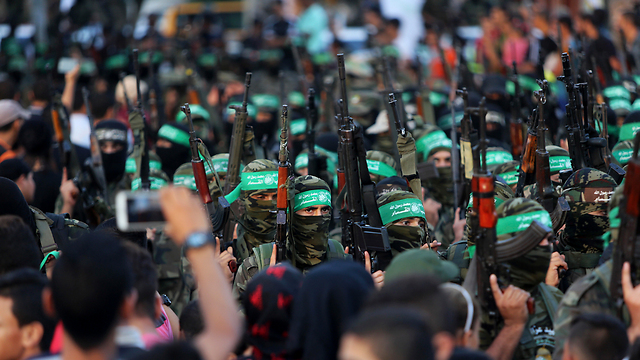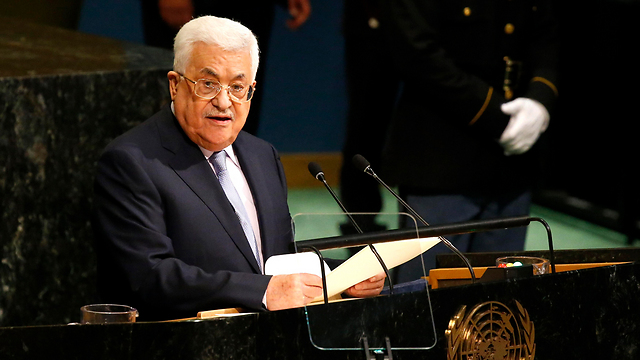Negotiators from rival Palestinian factions Fatah and Islamist group Hamas will discuss security in the Gaza Strip at unity talks in Cairo on Tuesday, including a proposal that would see Fatah security personnel deployed to Hamas-dominated territory.
The plan for 3,000 Fatah security officers to join a Gaza police force over the course of a year, part of a unity deal mediated by Egypt in 2011, would restore much of the influence of Fatah leader President Mahmoud Abbas in Gaza and further loosen Hamas' grip.
The deal was never implemented.

Rami Hamdallah and political leader of Hamas Ismail Haniyeh shake hands as Hamas transfers administrative power to the PA (Photo: AFP)
The Western-backed mainstream Fatah party lost control of the enclave to Hamas, considered a terrorist group by the West and Israel, in fighting in 2007. The loss damaged Abbas' credibility in the eyes of the West and Israel, after years of being their main Palestinian diplomatic counterpart.
But under Egypt's mediation, major steps have been made towards narrowing rifts since Hamas handed administrative powers in Gaza to a Fatah-backed government last month.
The move was a major reversal for Hamas and was partially prompted by the group's fears of potential financial and political isolation after its main donor Qatar suffered a major diplomatic crisis with key allies.
"The sides will discuss the security issue, especially in Gaza, in the way that serves the home front, enforces the rule of law in a professional and national way and is not factional," said Hamas spokesman Fawzi Barhoum.
Under the deal, Hamas would still have the most powerful armed Palestinian faction, whose estimated 25,000 well-equipped fighters have fought three wars with Israel since 2008.
"The issue of arms of resistance is not up for discussion," Hamas official Sami Abu Zuhri told Reuters. Israel's enmity with Hamas means greater unity with Fatah is unlikely to help any future efforts for a peace deal with Israel.
But both sides hope that the deal's proposed deployment of security personnel from the Fatah-led Palestinian Authority to Gaza's borders will encourage Egypt and Israel to ease their tight restrictions at border crossings, a badly needed step to help Gaza revive its economy and improve the living standards of its two million residents.
Officials said that apart from the implementation of the 2011 agreement and security, the Cairo talks would also cover issues such as setting a date for presidential and legislative elections and reforming the Palestine Liberation Organization, which is in charge of long-stalled peace efforts with Israel.
"What happened in the past days is something like a declaration of principles while the two sides have postponed final status issues to the talks in Cairo," said Gaza political analyst Akram Attallah.
Abbas has pledged there would be "one authority, one law, one administration, one weapon" in the Gaza Strip, a statement seeming to challenge Hamas' continued security dominance.
But Tayseer Nasrallah, a member of the Fatah Revolutionary Council, told Reuters: "There are difficult challenges and it will take time to overcome them.
Outstanding issues include the fate of 40,000 to 50,000 employees hired by Hamas over the past 10 years and its demand Abbas lift economic sanctions he imposed in recent months to try to pressure the group to compromise.

Hamdallah and Haniyeh
Photo: AFP
מומלצים


















